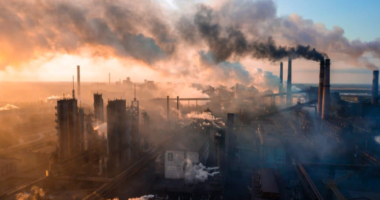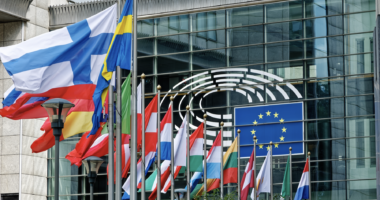Climate, Health and Equity Brief
Forward Momentum in the U.S.
April 8, 2024

The Climate, Health & Equity Brief is GMMB’s take on the latest news on the current impacts of climate change. If you haven’t subscribed yet, you can do so by clicking here.
Hot Topic: Power moves. In the past two weeks, the Biden Administration and the Environmental Protection Agency announced major investments and actions to combat climate change.
First, the Biden Administration announced the single-largest decarbonization investment in American history, awarding $6 billion to 33 projects in 20 states that aim to sharply reduce emissions from heavy industry, which accounts for about one-third of U.S. carbon dioxide emissions. Together, the projects are projected to eliminate 14 million tons of CO2 annually by helping decarbonize the American factories responsible for the production of buildings, roads, appliances, cosmetics and even processed foods.
Next, the EPA announced it will distribute $20 billion to eight nonprofits to help finance clean-energy projects nationwide. Recipient organizations have committed to leveraging nearly $7 in private capital for every $1 of federal investment and pledged to ensure that at least 70 percent of the funds will benefit disadvantaged communities. The projects are projected to reduce up to 40 million metric tons of carbon dioxide per year—equivalent to the annual emissions of nearly 9 million gasoline-powered cars.
Last week, the EPA also announced new emissions regulations for heavy-duty vehicles, including tractor-trailers, ambulances, R.V.s, heavy trucks and moving vans. The rules aim to limit the amount of pollution allowed across auto product lines over time, starting in model year 2027. Manufacturers can decide how to comply, with options ranging from electrifying their fleets to increasing the use of hybrids or hydrogen fuel cell vehicles to sharply increasing the fuel efficiency of conventional trucks.
Finally, the EPA has reached an agreement to close the last coal-fired power plant in the greater New England area by 2028 and transform the site into a renewable energy park that will host solar power and battery storage systems. According to the Sierra Club, the announcement will make New Hampshire the 16th coal-free state in the U.S. and New England the second coal-free region in the country.
These moves show critical momentum during a news week that wasn’t short on distressing climate news. From rapid global deforestation and collapsing coastal roadways to warnings about heat impacts on brain health and the threat of a dire 2024 hurricane season, all signs show there is still more work to be done.
Human Health
According to recent studies, climate change has alarming implications for brain health as increases in temperatures, atmospheric concentrations of carbon dioxide, and air pollution show links to cognitive decline and an elevated risk of neurodegenerative diseases such as Parkinson’s and Alzheimer’s disease. (Geographical)
New research from the National University of Singapore has found that temperatures above 86 ℉ reduce sperm count, which has significant implications for fertility rates worldwide as global temperatures continue to increase. (The Telegraph)
Planetary Health
Despite progress, the annual World Resources Institute’s Forest Pulse analysis found that the world failed to significantly slow the pace of global deforestation in 2023, losing tropical forest acreage equal to the size of Switzerland and calling into question the commitment made by 145 countries to halt all forest loss by 2030. (The New York Times)
For the first time since recordkeeping began, Atlantic water temperatures have stayed above 68°F for an entire year, prompting Colorado State University meteorologists to warn of an unprecedented 2024 hurricane season that is likely to bring a “staggering” 23 named storms, 11 hurricanes, and five major hurricanes. (Axios)
Rapid deforestation across Indonesia is intensifying the impact of climate disasters, as forests are vital to slowing flooding, soaking up rainwater, reducing erosion, and releasing moisture during droughts and fires shrink at a rapid pace. (AP News)
Amidst a climate-fueled drought, Venezuela is grappling with an unprecedented onslaught of wildfires, with over 30,200 fire points detected from January to March—the highest level since recordkeeping began—as high temperatures and low rainfall help fires spread out of control across the country. (CNN)
Equity
Congress has passed a law rectifying a decades-long oversight that denied tens of thousands of legal migrants from Pacific island nations access to programs like FEMA, clearing the way for Indigenous Pacific survivors of the Maui wildfires to get help. (Grist)
Indoor workers across California who have been pushing for protections from increasing heat, including the right to work breaks, water, and designated cool-down areas, have been “blindsided” by the state’s Department of Finance instructing Cal OSHA to pull the matter from its agenda, underscoring the need for federal worker protections as temperatures rise. (NPR)
Politics & Economy
A new study of monthly price indexes in 121 countries from 1996-2021 found that increasing global average temperatures and more intense and frequent heat waves are driving up food prices, with the trend likely to worsen over the next decade. (Axios)
A new report shows that approximately 80% of recent CO2 emissions are linked to just 57 producers of fossil fuels and cement and that most companies have expanded their fossil fuel production since 2015, the year when nearly all countries signed the U.N. Paris Agreement. (Reuters)
Grid executives are warning that the U.S. electric grid is increasingly vulnerable to blackouts due in part to soaring energy demand from new technologies, a problem exacerbated by a slower-than-necessary transition from retiring coal plants to clean power sources. (POLITICO)
A new study measuring methane emissions at roughly 20 percent of large, active U.S. landfills found that they are releasing three times as much methane as reported to federal regulators. (The New York Times)
The International Code Council, which sets model construction standards for new homes, failed to include building electrification measures in their 2024 code, shifting the cost of increasing capacity for electric technology to homeowners. (Bloomberg)
California’s scenic Highway 1 is showing serious signs of erosion, signaling a political, logistical, and financial challenge ahead for maintaining the road’s infrastructure in the face of sea level rise and intensifying winter storms. (San Francisco Chronicle)
Life as We Know It
According to a new scientific literature review, up to 70% of today’s wine regions could disappear within decades due to excessive drought and more frequent heat waves. (CBS News)
A new study has found that the melting of Greenland and Antarctica ice sheets has slowed Earth’s rotation, likely postponing the introduction of the first negative leap second—or 59-second minute, which could significantly impact computerized systems—by three years. (Earth.com)
Action
The EPA has awarded $20 billion in Inflation Reduction Act funding to eight nonprofits, each of which has committed to leveraging nearly $7 in private capital for every $1 of federal investment to help finance clean-energy projects nationwide. (The Washington Post)
The Biden administration has allocated $6 billion for projects that aim to significantly reduce greenhouse gas emissions from heavy industrial sectors in the U.S.—the largest decarbonization investment in American history. (Canary Media)
A new EPA rule increasing emissions limits for more than 100 vehicle types, including tractor-trailers, ambulances, RVs, garbage trucks and moving vans, is expected to prevent about a billion tons of greenhouse gas emissions by 2055. (The New York Times)
The EPA reached an agreement to close the last coal-burning power plant in the greater New England region by June 2028 and transform the site into the state’s first renewable energy park, which will host solar power and battery storage systems. (AP News)
The World Bank announced a $750 million loan to aid Colombia in strengthening its climate resiliency and renewable energy efforts. (Reuters)
The IKEA Foundation announced a $100 million grant to support The Drive Electric Campaign, a global initiative led by ClimateWorks Foundation that aims to accelerate EV uptake globally. (Reuters)
Kicker
Does your city have enough trees? Discover your local tree equity score and learn how a lack of tree canopy impacts air quality and human well-being and disproportionately affects low-income communities and communities of color.
Today the E.P.A. is taking another giant step forward to protect future generations from climate change.”
– EPA Administrator Michael S. Regan
The GMMB Climate, Health & Equity Brief would not be possible without the contributions of the larger GMMB team—Aaron Benavides, Stefana Hendronetto, Nikki Melamed, Sharde Olabanji and Marci Welford. Feedback on the Brief is welcome and encouraged and should be sent to [email protected].




